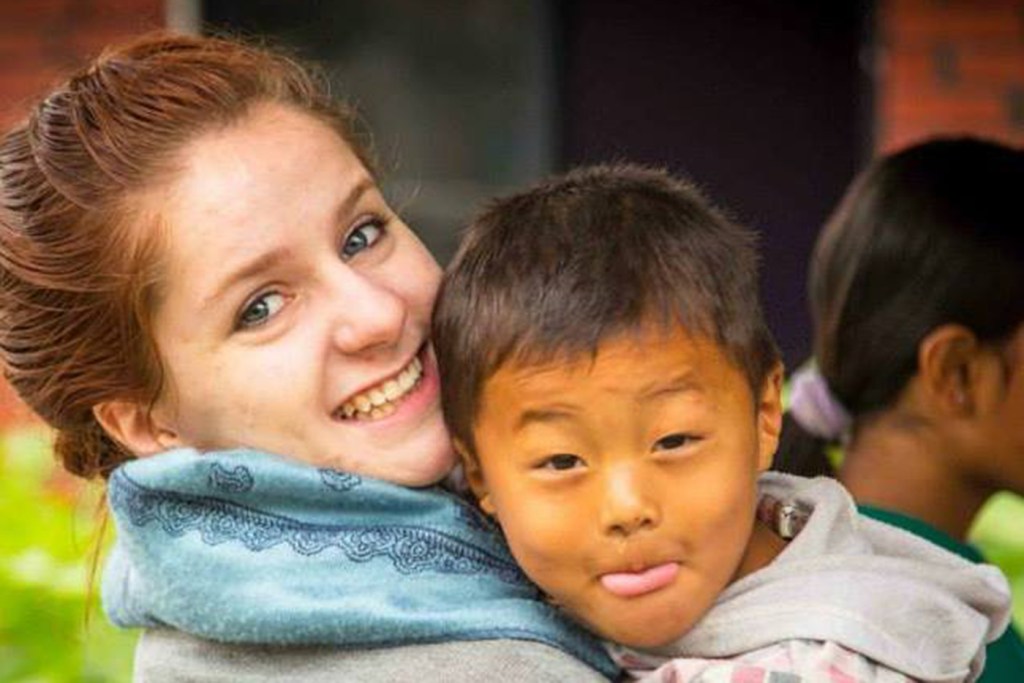New student embraces humanitarian role in Nepal

Katie Brown was in her third-floor apartment in Kathmandu when a magnitude-7.8 earthquake struck Nepal in April, killing more than 9,000 people and causing some $10 billion in damage.
Upon seeing her kitchen collapse and her windows shatter, she dropped to the floor and crawled into her bathroom to seek cover from the catastrophic temblor. Ninety seconds later, the shaking stopped and she was safe.
Brown grabbed her purse, ran outside, and then hitchhiked across the city to meet up with a friend. They camped under a tarp for a few days and then made their way to the U.S. Embassy, where Brown called her parents in Pittsburgh.
“This was absolutely the most terrifying thing I’ve ever been through,” she says. “It was a 24-hour period marked by confusion and chaos.”
‘I’m not coming home right now’
Brown, SSH’19, is an incoming freshman at Northeastern University. Although she was accepted in 2014, she deferred her enrollment for one year in order to work for Prisoners Assistance Nepal, a grassroots organization dedicated to ridding prisoners—and their children—of unnecessary hardship.
For Brown, Nepal is something of a second home. She first visited the landlocked country in high school, when she volunteered for a small nonprofit dedicated to empowering women in rural villages. Since then, she’s reveled in its “culture of religious cohesion and national unity” and developed close friendships with Nepalese families who lovingly refer to her as their “daughter.”
When the quake struck, Brown was finishing up her eighth month with the grassroots group, which counted on her to write grant applications and manage its social media accounts. Her parents and her friends begged her to return home, but she refused. Surveying the damage caused by the earthquake—and being apprised of the death toll—convinced her to stay and help the country recover.
“No,” she told her parents, “I’m not coming home right now. I’ll let you know when I will.”
Brown spent the next five weeks living in an open-air shelter with more than 100 children, innocent kids whose parents had been locked up in over-crowded prisons. She purchased supplies for the youngsters—tarps, water purifiers, bags of rice—and then trekked into rural villages to deliver food and dole out rudimentary medical care to hundreds of other quake victims. She served rice pudding in makeshift kitchens in the middle of temple grounds and helped organize delivery trucks filled with food and cooking supplies.

Families displaced by the earthquake take shelter under a makeshift tent on the streets of Kathmandu.
“One of the most amazing things I saw was the community response,” she explains. “People with no affiliations with nongovernmental organizations or other aid-based groups were helping out and giving people their extra food.”
Fundraising from far away
Brown returned home to suburban Pittsburgh in June, whereupon she continued to work on behalf of Prisoners Assistance Nepal. Over the past four months, she’s organized benefit dinners and lecturers at local libraries and churches, raising $6,000 for the organization.
Brown, who plans to study economics at Northeastern, wants to parlay her education into a career in international aid. Working for the World Bank or the United Nations Children’s Fund, she says, would be a dream come true.
“The economics of aid is becoming increasingly important as NGOs gain more and more weight,” she explains. “Knowing economics is useful for someone like me who wants to work in international development.”





